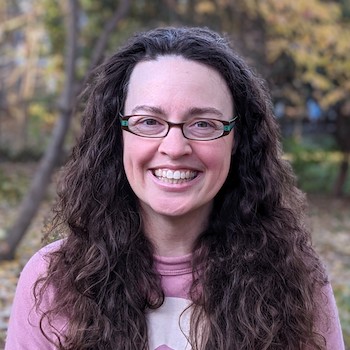
- This event has passed.
02/07/24: Claire Pettersen

Please join us for a Great Lakes Seminar Series – subscribe!
Time: 12:00-1:00 pm EDT
Location: NOAA Great Lakes Environmental Research Laboratory, Lake Superior Hall and Virtual
Presenter: Claire Pettersen, Assistant Professor, University of Michigan Climate and Space Sciences and Engineering
Title: Observing, Characterizing, and Quantifying Wintertime Precipitation Processes: A 10 Year Retrospective from Marquette, Michigan
About the presentation: Winter precipitation (rain and snowfall) has widespread impacts on communities through regional ecology, hydrological planning, and socioeconomic effects. In this presentation, I will feature important findings from winter weather regime-based studies leveraging precipitation observations from a long-term, ground-based instrument suite in the Northern Great Lakes region. Realistic estimates of rain and snowfall in weather forecasting and climate models are challenging due to uncertainties in cloud and precipitation parameterization schemes. Additionally, remote-sensing observations require assumptions about hydrometeor microphysical and radiative properties. High temporal resolution, multi-instrument observations of clouds and precipitation can help better constrain processes in models and refine retrieval assumptions, leading to more accurate quantification of accumulation. I will highlight the advantage of utilizing long-term observations to examine key physical and dynamical precipitation processes through the lens of regime partitioning. Precipitation regimes are determined using observations of macrophysical and microphysical properties, large-scale environmental conditions, and thermodynamic profile characteristics. Key findings demonstrate that regime-dependent characteristics of precipitation lead to distinct differences in frequency, intensity, and phase, microphysical properties, and overall accumulation. Additionally, I will demonstrate how winter precipitation regimes in the Northern Great Lakes region are tied to significant seasonal and subseasonal, synoptic, and thermodynamic conditions such as atmospheric blocking and anomalous moisture transport (atmospheric rivers).
About the speaker: Claire Pettersen is currently an Assistant Professor in the Department of Climate and Space Sciences and Engineering at the University of Michigan. Prior to joining the University of Michigan in 2022, Dr. Pettersen worked as an engineer and research scientist at the University of Wisconsin-Madison for more than 15 years. Dr. Pettersen’s research is focused on cold-season and cold-location precipitation (snow, mixed-phase, rain), as well as associated cloud, thermodynamic, and synoptic characteristics. Much of her research is focused on the mid- and high-latitude regions of the world where the climate is rapidly changing. Dr. Pettersen’s research lies at the intersection of science and instrumentation and utilizes ground-based, airborne, and satellite observations of clouds and precipitation. Additionally, Dr. Pettersen has been involved with either ground-based and airborne field campaigns each year since 2004, including installing and deploying instrumentation on both the Greenland and Antarctic Ice Sheets. Dr. Pettersen’s research is supported by program offices and science teams within NASA, NOAA, and NSF. She was a recipient of the 2019 NASA Early Career Award (New Investigator Program) to investigate snow properties using ground-based instruments such as vertically profiling radars and video imagers. Additionally, Dr. Pettersen is currently a Mercator Fellow for the Arctic Amplification: German Climate Relevant Atmospheric and Surface Processes and Feedback Mechanisms (AC)3 project.
**Registration is not required**
_____________________________________________________
IMPORTANT VISITOR INFORMATION
All seminar attendees are required to receive a visitor badge from the front desk at the NOAA Great Lakes Environmental Research Laboratory facility. Attendees need to present a valid U.S. photo ID or green card. If you are a Foreign National, we encourage you to attend virtually. For questions regarding building access, please email Margaret Throckmorton at [email protected]. Additional questions? Contact Margaret Throckmorton: [email protected]; visit ciglr.seas.umich.edu for more information.
